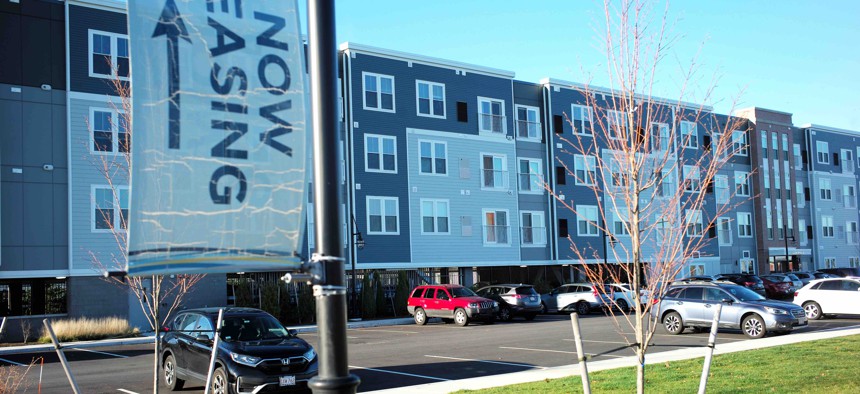HUD Offers Cities Help to Add Housing Near Transportation Options

Jonathan Wiggs/The Boston Globe via Getty Images
As part of the Thriving Communities effort, the federal agency will supply technical assistance to revive economically distressed areas.
Local governments can now get a helping hand as they try to add housing near new transit stops and other transportation improvements, thanks to a program launched by the Department of Housing and Urban Development Thursday.
The federal agency is offering $5 million worth of help to communities with the effort, as part of the rollout of the 2021 infrastructure law. HUD officials expect the money will be enough to support 30 to 35 cities in its first yearly allotment, although they hope to use the experiences from those initial participants to educate people from other jurisdictions later.
The technical assistance is part of the Biden administration’s Thriving Communities effort, which involves contributions from eight federal agencies, to revive economically distressed areas that have faced historical disinvestment. The Transportation Department, for example, is helping underserved communities apply for grants created by the infrastructure law.
The housing agency, on the other hand, is helping local governments add housing at the same time they are improving their transportation options, such as adding light rail, extending bike paths or revitalizing a rural main street. The goal is to make sure that people and businesses already in those disadvantaged areas benefit from the improvements.
HUD is offering assistance with four issues:
- Identifying vacant land near transportation projects that can be used to build housing.
- Preserving affordable housing.
- Streamlining the regulatory process for building new housing.
- Improving coordination among government agencies on housing production.
“Infrastructure fundamentally exists to provide connections, and someone’s home is typically the starting point or the end point for where they’re coming from or trying to get to,” said Aaron Shroyer, the special adviser to the assistant secretary for policy development and research at HUD.
Applications will be accepted on a rolling basis, but Shroyer encouraged local jurisdictions to apply quickly because he expects the demand will be high. The formal criteria favors jurisdictions with fewer than 250,000 people. Shroyer said HUD officials will also be looking for local governments that are already working well with other metropolitan planning organizations, public housing agencies and transit providers.
The local governments that HUD selects will receive help from one of two consortiums of experts that HUD picked for the job. One is led by Abt Associates, which is partnering with Alabama A&M University, EPR PC, Equitable Cities and National Housing Trust. The other is led by ICF, which is working with Smart Growth America, Partnership for Southern Equity and Morgan State University.
Daniel C. Vock is a senior reporter for Route Fifty based in Washington, D.C.
NEXT STORY: Tech disruption powers smart city expansion






